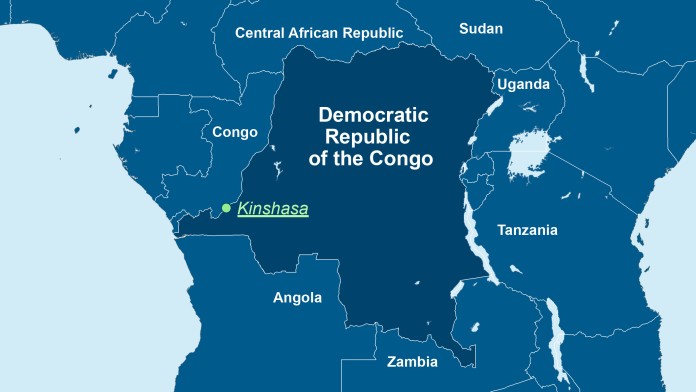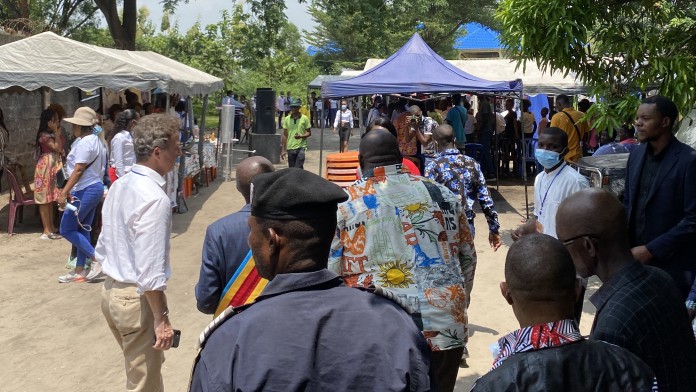
As of: 11/2022
The D.R. Congo is torn by conflict, especially in the eastern part of the country, where armed conflicts are prevalent, often with attacks on the civilian population. Many people have therefore left their homes, and the number of internally displaced persons is currently estimated at 5.2 million. Due to conflicts and poor governance, the population has lost confidence in the state, which provides barely any infrastructure or services. Roads, schools, markets, health centres and other facilities are often in poor condition or are completely absent. The Peace and Stabilisation Fund, which KfW set up on behalf of Germany together with the Congolese government, finances infrastructure that contributes to a peaceful process and benefits all societal groups equally.

The D.R. Congo remains a fragile state. Decades of armed conflict and poor governance have largely eroded state authority. The infrastructure – where available – is often destroyed. The very large, ethnically heterogeneous country is unable to settle into peace; many people have lost their homes and thus lost their livelihoods and sources of income. They often view associating with armed groups or performing dangerous work in illegal mines as the only way out. There are very few other ways to generate income. In addition, the Ebola epidemic and COVID-19 have caused the situation to further deteriorate and exacerbated the country’s economic decline. Due to the ongoing national and international crises, prices for important goods such as food and petrol have risen sharply. According to the UN World Food Programme, around 26.2 million people in the D.R. Congo are suffering hunger, which is a quarter of the total population. Another 4.4 million people in the country are also affected by acute undernourishment.
On behalf of the German Federal Ministry for Economic Cooperation and Development (BMZ), KfW and the Congolese government launched the Peace and Stabilisation Fund in 2007, which is now in its third phase and is expected to be funded until 2027. The fund’s resources help to create jobs and enhance infrastructure. Through labour-intensive measures, the Peace Fund enables people to generate income, which stimulates local economic cycles. The aim is to improve people’s living conditions quickly and visibly. This “peace dividend” strengthens trust in the state and promotes peaceful coexistence.
The actions financed by the Peace Fund are embedded in a global strategy to support the country’s security and stability. They focus on the provinces of North and South Kivu and Ituri (formerly Orientale Province) in the east of the country, where there is a high risk of violent conflict.
KfW is financing the construction of roads, bridges, schools and hospitals in a large number of small-scale projects. Fields are being made usable again and efforts are being made to combat erosion to preserve agricultural soil.
The focus is on the peace-building effect. The population actively participates in all measures. It is particularly important that the financed projects contribute to solving existing conflicts and promote dialogue between the population groups. An examination is always made as to whether the various ethnic groups benefit equally from a project.
The Peace Fund projects are selected on the basis of transparent criteria: decisive factors are high visibility and fast implementation, the creation of many jobs and the previous experience and qualifications of the project-executing agencies. Because government administration often does not function, companies and church executing agencies or non-governmental organisations are also commissioned to implement the projects. Independent fund management controls the proper use of the fund’s resources.
So far, the Peace Fund has financed 61 individual projects in the east of the country (North Kivu, South Kivu, Maniema and Ituri), as well as in the greater Kinshasa area and in the Bandundu Province. Funding was provided for
Social infrastructure:
Economic infrastructure:
Agricultural infrastructure:
The measures have provided more than 1,700 people with a permanent job and employed a further 5,000 people for at least one month.
In the current third phase of the fund, 15 individual projects are being implemented in the provinces of North and South Kivu and Ituri, with another 12 in preparation.
The project contributes to the achievement of these following United Nations Sustainable Development Goals:
KfW Group
KfW Development Bank
Governance, biodiversity and health in Central Africa
Competence Centre for Social Development, Governance, Peace
KfW Office Kinshasa
7, Avenue Comité Urbain
Gombe, Kinshasa
Congo, D.R.